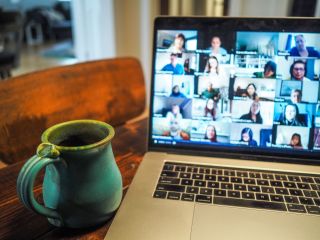Zoom and similar video-based platforms make it easy to record a lecture or class discussion. Making these recordings available can allow students to review material and, if they missed the live session, catch up later.
But there are some questions instructors should ask and answer before hitting that red button, especially if students are being recorded in addition to the professor.
Should live class sessions be recorded in the first place?
“There’s a tension here around privacy and availability of content,” says Soraya Okuda, education and design lead at Electronic Frontier Foundation, a nonprofit with a mission to defend civil liberties online. If a student misses a live session, it can be beneficial to have talks recorded to listen back on later. “But in video calls, students’ faces, names, voices, and home environments can be captured,” says Okuda. “This can create a tricky privacy circumstance for instructors.”
She adds that before recording a class, instructors should consider how the data will be stored, if it will be publicly accessible, and if and/or when it will be deleted.
says that Students should be informed of recordings, says Troy Williams, managing director of University Ventures, a higher ed venture capital firm. “Not all students can connect in real-time,’ says Williams. “Many students are struggling with inadequate bandwidth or are having to share it with family members. They may be having to share the computer itself as well.”
“Even outside of the current COVID-19 issues, there have always been good reasons to record class hours for students, which is why there is a whole lecture capture industry,” says Williams, a former senior executive at Macmillan where his focus included university systems and student performance outcomes. “The fact is that some students will watch the class hour multiple times to pick up things they missed the first time.”
How do you record sessions and respect student privacy?
“An instructor may want to think through a few things in setting up their call,” Okuda says. “A big one is not requiring students to have their video turned on during classes, and providing other ways to participate. For example, by voice, chat, or filling in a shared notes doc.”
Some of this is about teaching policies but there are also technical questions. “Can the instructor only record themselves, rather than including students in the video?” she says. “What notice can instructors give prior to recording a video of a class? Are there opportunities for students to opt out?”
“All students should be made aware that class is being recorded and have to acknowledge that they are aware. In this way, students are not caught off guard,” Williams says.
In order to protect privacy, institutions should make sure that only registered course students have access to any recordings that include student participation. Policy should also be set around how long any recording should be archived and when it is destroyed.
Do students really mind?
Tanya Joosten is director of Digital Learning Research and Development, and co-director of the National Research Center for Distance Education and Technological Advancements at the University of Wisconsin-Milwaukee. She has been recording students as part of her work as a social scientist since the 1990s, and although student privacy issues are often brought up, it’s not a huge real-world concern of students in her experience. “I’ve recorded hundreds of students,” Joosten says. “It’s very, very seldom that I’ve ever experienced student privacy issues where they didn’t want to be recorded.”
Even so, Joosten says instructors, in general, should consider what class activities actually need to be recorded and would be beneficial for students to go over later. “A lot of times we gravitate to video because it replicates face-to-face so much, and sometimes video is just not the best for learning,” she says.
Ultimately, whether online or in-person, “We shouldn’t be lecturing,” Joosten says. “There’s research that shows that that’s not a good teaching method and very outdated.”
Will recordings make live instructors obsolete?
Joosten says she has long heard a concern from fellow professors that recording classes will lead to professors becoming obsolete.
“‘They’re going to take all of our recorded lectures and they’re going to get rid of us.’ ‘They won’t need us anymore if our lectures become this digital content,’” Joosten says the complaint goes, but professors will be happy to hear those fears appear unfounded.
“In the research that I’ve done, it’s absolutely the opposite,” Joosten says. “Students are asking for more from their instructors and not more lectures, but more interaction with the faculty members.”

